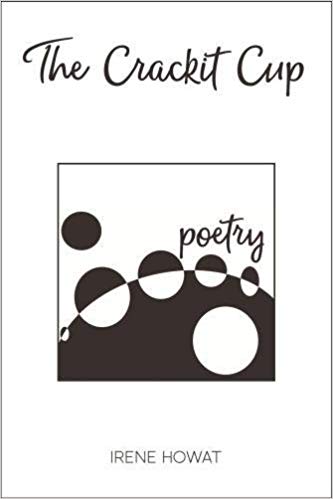Many television and radio programmes and magazine and newspaper articles have been reflecting on the recent centenary commemoration of the end of the First World War. None of them have moved me like this little book by Irene Howat.
The Crackit Cup is a cycle of poems dealing with the devastating impact of the War on a small rural Scottish community. It is written in Scots, but with the English version of each poem given on the opposite page, so that if you don’t know Scots, or only know some words or expressions, you can still follow the meaning. However, the Scots versions have their own distinctive vigour.
Irene deals with the very personal effects of the war on individuals and community – the arrival of telegrams bearing the news young wives never wanted to hear; the soldiers returning to their wives and families shell-shocked and shattered; the children who never really knew their fathers.
But all revolves round the central character, “Tuim-heidit Tam”, a simple soul who was unfit for military service; “the yin whase king hud nocht fur im tae dae”. But Tam fought his own war in his simple and kindhearted way. While the other young men were fighting in France, he worked away, unassumingly giving support and encouragement to whomever he could.
Tam is the crackit cup; ‘useful and still beautiful despite a little damage’. Irene says that “Tam has lived in my imagination for some time”, and he is one of the most compelling characters you are likely to come across in any form of literature. But you will also meet Kate and Willie and Wattie and Robbie and Maisie. The Crackit Cup is a celebration of the little people in obscure places – their heartbreak, their despair, their faith and their hope.
The first poem begins with the lines:
The pellock that felled Frank Ferdinand
skited roon the warld;
and the last poem ends with:
the meenister raxed up is airms
ower the yin whase king
hud nocht fur im tae dae
an lippened Tam fur aye
tae is Maister.
In between, we find Tam comforting a widow:
The weeda grat awfu tears
Burnin lyk the sin.
Tam sat quate aside er.
When she stapped
He gied her is cup o watter.
We hear Robbie’s thoughts of his wife and baby as he went over the top:
I knew I was going mad,
But it was a comfort to be mad
At Passchendaele.
We meet a returned soldier, who had lost his brother in the war and who hardly spoke a word to anyone, finally opening up to Tam about what had happened to his brother. But he couldn’t live with his loss. Not all stories have happy endings.
None of the poems is overtly religious, but the whole is suffused with grace, and Tam shows what it means to live a Christian life. This book is a delight and a treasure and very moving.
This book is available to purchase for £5 (inc. P&P) directly from Irene Howat (57 Garvine Road, Coylton, Ayr, KA6 6NZ).
This review was originally published in 'The Record'.
Alex Macdonald, Former Free Church Moderator

